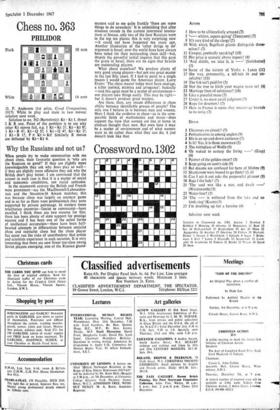Chess no. 363
PHILIDOR
G. F. Anderson (1st prize, Good Companions, 1917). White to play and mate in two moves; solution next week.
Solution to no. 362 (Bartolovic): Kt - Kt 1, threat 2 K R any. Point of the problem is to see why other Kt moves fail, e.g. 1 Kt - Kt 3?, Kt - Kt 8!; 1 Kt - B 4?, Kt - Q 5!; 1 Kt - Q 4?, Kt - Kt 2!; I Kt - B 1?, P x Kt = Kt! Similarly R moves are defeated by Kt - Kt 4.
Why the Russians and not us?
When people try to make conversation with me about chess, their favourite question is 'why are the Russians so good?' If they are slightly more knowledgeable they ask why Jews play so well— if they are slightly more offensive they ask why the British don't play better. I am convinced that the answer in each case is that it is a matter of social and economic conditions, not racial aptitudes.
In the nineteenth century the British and French were prominent—see the MacDondell-Labourdon- nais and the Staunton-St Amant matches; this was because chess was largely an amateur game and in so far as there were professionals they were supported by private patronage. In modern times totalitarian countries—fascist or communist—have excelled. I think there are two reasons for this; there has been plenty of state support for prestige reasons and it has been one of the safest forms of intellectual occupation—there have been half- hearted attempts to differentiate between socialist chess and capitalist chess but the chess player has never run the risks of unorthodoxy that artists i and scientists experience in such societies. It is very interesting that there are now fewer top-class young Soviet players emerging; one of the Russian grand- masters said to me quite frankly 'there are more things to do nowadays.' It is astonishing that after nineteen rounds in the current interzonal tourna- ment at Sousse, only two of the four Russians were in the to ten places; this is very surprising now —it could not have happened ten years ago. Another illustration of the 'other things to do' argument is Israel; over the world Jews have always been noted for their outstanding chess skill—but, despite the powerful initial impetus that this gave the game in Israel, there are no signs that Israelis are outstanding players.
What about ourselves? We produce plenty of very good young players—but not one great master in the last fifty years. If I had to point to a single reason I would quote the American player, Larry Evans: The chess master today must, have courage, a killer instinct, stamina and arrogance'; basically —and this again must be a matter of environment— our players take things easily. This may be right— but it doesn't produce great masters.
Are there, then, any innate differences in chess ability between identifiable groups of people? The only one I believe in is between men and women. Here I think the evidence in chess—as in the com- parable fields of mathematics and music—does support the view that women are less at home in abstract thought than men. But even here it may be a matter of environment and of what women want to do rather than what they can do; it just doesn't look like that


































 Previous page
Previous page